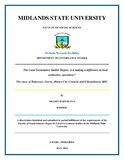Please use this identifier to cite or link to this item:
https://cris.library.msu.ac.zw//handle/11408/2793| Title: | The Local Governance Studies Degree; is it making a difference in local authorities operations?: the cases of Bulawayo, Gweru, Harare City Councils and Chirumhanzu RDC | Authors: | Nhamo, Marvelous | Keywords: | Operational challenges Local government Zimbabwe Service delivery |
Issue Date: | 2014 | Publisher: | Midlands State University | Abstract: | Operational challenges in Zimbabwean local government have been and are largely still a common phenomenon. They span from financial, human, administrative and institutional operations. However addressing them has always been the big question. Human capital with the adequate skills has been lacking especially after the 2008-10 brain-drain that saw most skilled personnel flee to greener pastures. Service delivery has also been on the decline and training for capacity building became a priority. In 2004, the Midlands State University launched a 4 year degree programme-the Local Governance Studies Honors degree that was aimed at capacitating human resources in local government with the necessary skills for effective management that countered the operational problems and ultimately improve service delivery. These human resources would fill key posts in local government. This study therefore sought to analyze the impact of the degree in the operations of local authorities. The study was carried out at Harare, Bulawayo, Gweru City Councils and Chirumhanzu RDC. The primary objective was to investigate whether or not the LGS degree had made a difference to local authority operations. Literature review substantiated that operational problems in local authorities were a concern, however efforts to address them by capacity building through academic training were few in motion and unconsolidated. The researcher used purposive sampling and a sample of 25 respondents from the 4 local authorities comprising LGS degree holders and local authorities’ management. 9 of the 25 were LGS degree holders and all responded to the questionnaires and interviews. Questionnaires and interviews were the research instruments used to collect data and descriptive research design was employed. Collected data was collated, presented and analyzed to which conclusions were drawn. Findings indicated that the degree has a rich skills base and most degree holders have found it useful. It was mostly useful and effective in administration, in particular strategic planning. However findings indicate that even if the degree is useful, its impact is yet to fully materialize as other challenges like financial resources, management counterparts’ support and politics are a hindrance. In financial management the degree needs more depth. Recommendations from the study include considering depth in financial management modules, making local government qualifications prerequisites in local government and that local government management should consider the LGS degree as a skills rich programme and enroll their staff in the programme. | URI: | http://hdl.handle.net/11408/2793 |
| Appears in Collections: | Bsc Local Governance Studies Honours Degree |
Files in This Item:
| File | Description | Size | Format | |
|---|---|---|---|---|
| STARSHYN FINALE.pdf | Full Text | 1.39 MB | Adobe PDF |  View/Open |
Page view(s)
164
checked on Feb 14, 2026
Download(s)
94
checked on Feb 14, 2026
Google ScholarTM
Check
Items in MSUIR are protected by copyright, with all rights reserved, unless otherwise indicated.



